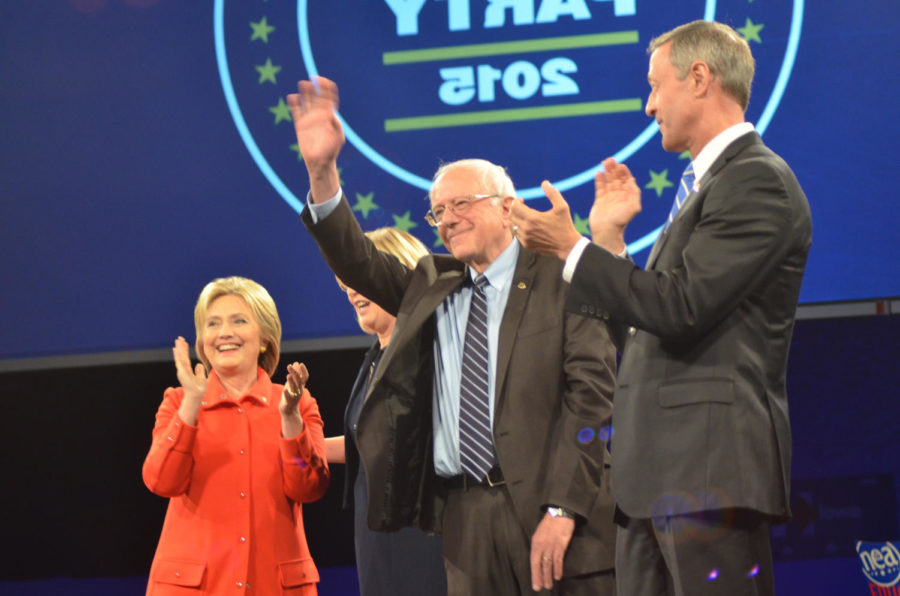Editorial: Democratic candidates missed chance to talk about student debt
From left to right: Former Secretary of State Hillary Clinton, Vermont Sen. Bernie Sanders and former Maryland Gov. Martin O’Malley. All three candidates for president spoke at the Iowa Democratic Party’s annual Jefferson-Jackson Dinner in Des Moines on Saturday, Oct. 24.
October 25, 2015
This weekend, in an overflowing downtown Des Moines, Martin O’Malley said he was going to fight the National Rifle Association and raise minimum wage; Hillary Clinton jabbed at the opposing party and brought Katy Perry to Iowa’s capitol; and Bernie Sanders boasted his lack of super PAC support and emphasized his history of opposing popular views.
These three Democratic presidential candidates riled up crowds with these talking points and more in Des Moines this weekend at the Iowa Democrats’ Jefferson-Jackson (JJ) dinner.
Among other topics discussed were climate change, gun legislation, trade agreements, gay rights and past political dirt against one another.
But where were the students, the future of the nation, in this hustle and bustle of colorful posters and raging crowds?
Sanders and Clinton said free tuition is the way to go and O’Malley briefly mentioned that he froze college tuition for four years during his time as governor of Maryland.
The JJ dinner is for Democrats to rile up their supporters and garner excitement. The Democratic candidates, trying to mimic the thunder President Barack Obama rumbled in the JJ dinner during his first presidential campaign, should use the dinner to excite people. They should also not waste the opportunity to lay out their plans to address national issues specifically, the issue on student debt.
The Democratic policymakers decided that state spending cuts are the reason college tuition has skyrocketed for most students, according to Vox News, and the solution? They say the federal government needs to step in.
Both Sanders and Clinton have shared plans about making college tuition virtually free, and O’Malley has said he wants to make college debt-free by “increasing grants for low-income students, asking public universities to freeze tuition rates and allowing borrowers to refinance their loans to take advantage of lower interest rates,” according to MarketWatch.
But, according to the Inside Higher Ed Survey on College and University Presidents, some public university presidents are concerned about federal government funding coming with the caveat of federal government restrictions.
However, state funding to colleges and universities depends upon the economy at the time. When times are good, less people are enrolling in college, and when the economy stoops, people flock to a degree, according to Vox.
Most Republicans, however, have appeared wishy-washy on their views to address the outrageous rates of student loans, not taking a definite stance on what they plan to do to fix the issue. Multiple Republican candidates have said they would focus on reforming the way higher education works by concentrating more on students and their families rather than governmental funding.
The issue of student debt shouldn’t only be a topic to rile up a crowd, or to rally cries of support.
Though the JJ dinner is, according to The Des Moines Register, “the final stretch before the first-in-the-nation caucuses on Feb. 1, as well as the moment when the real fever-pitch campaign activity begins,” to not specifically address one of the nation’s largest issues at such an event was a wasted opportunity.
So as the nation watched candidates ferociously articulate their plans into their microphones, students watched on, the thoughts of their future debts suppressed by the image of Left Shark prancing to “Firework.”







